Iran Deal Shaky Without Bipartisan Backing, Congressman Says
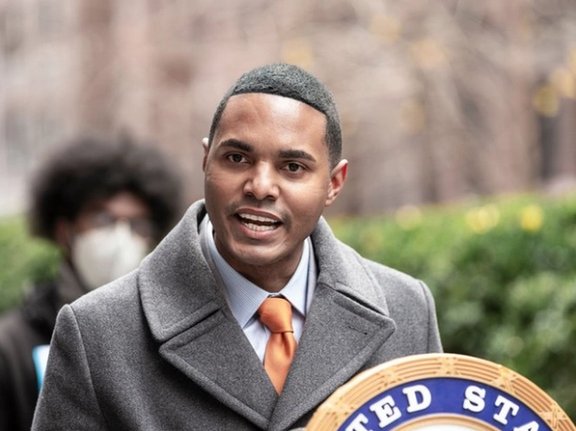
US Democratic Congressman Ritchie Torres says he believes there would be “bipartisan opposition” to the renewed nuclear deal with Iran.

US Democratic Congressman Ritchie Torres says he believes there would be “bipartisan opposition” to the renewed nuclear deal with Iran.
In a brief conversation with the American Israeli Public Affairs Committee broadcast Tuesday, the first-term representative said “a majority in both the House and the Senate” would oppose an agreement if brought to a vote.
Torres added that he is against the sanctions relief because the agreement under discussion would slow but not dismantle Iran’s nuclear program, noting that a deal between Washington and Tehran without bipartisan support would undermine the credibility of the United States.
“I worry about an endless cycle of a Democratic president renegotiating the Iran deal, followed by a Republican president who withdraws from it. We should have an agreement that can stand the test of time”, Torres said.
The original deal was rejected by the Congress in 2015 -- in the House by a 269-162 margin and in the Senate by a 56-42 majority — but it wasn’t enough to override a promised veto by former President Barack Obama.
Democrats are alarmed by reports that the Biden administration is considering removing Iran’s Revolutionary Guard (IRGC) from the State Department’s Foreign Terrorist Organization list.
Fifteen Democratic House members are expected to speak out against the potential agreement later on Wednesday, raising “concerns about the looming Iran deal” in a news conference outside the Capitol.

Nearly 200 Iran parliament members have written to President Ebrahim Raisi urging that Iran’s “red lines” and “national interest” be upheld in nuclear talks.
Tasnim news website close to the Revolutionary Guard reported Tuesday that 190 lawmakers have signed the letter and more might join the petition.
While the hardliners’ victory in the 2020 parliamentary election strengthened critics of the 2015 nuclear deal in the 290-seat body, Iran entered talks in Vienna saying that it would agree to restore the 2015 nuclear deal if the United States lifted ‘maximum pressure’ sanctions.
But all along the existing sanctions have been a source of major differences. While the US has agreed to lift nuclear sanctions, Iran has demanded the lifting of all sanctions imposed since 2018, including terrorism-related ones.
The parliamentarians’ letter is one example of Iranian criticism, or wariness, over the talks. Ali Khezrian, a parliament member, has issued series of tweets claiming that a draft agreement discussed in Vienna had abandoned a requirement set by Iranian Supreme Leader Ali Khamenei that the lifting of US sanctions be verified before Iran returned its nuclear program to JCPOA limits.
He cited specific articles of the draft agreement claiming he has access to it, while no one outside the circle of negotiators so far has seen the document. Khezrian claimes that article 5-1 and 5-7 do not fulfill conditions set forth by Supreme Leader Ali Khamenei.
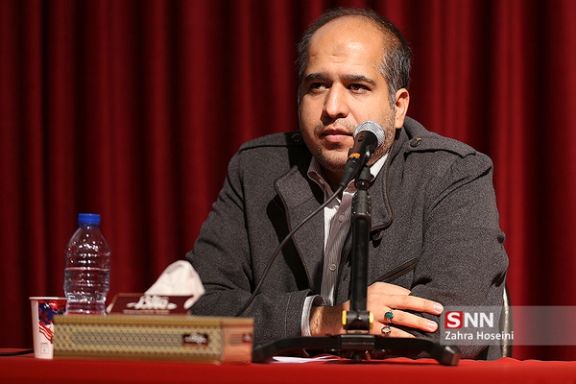
Al-Alam, Iran’s Arabic television station, has cited sources that the US had refused to lift the IRGC listing, demanding that Iran first abandon calls for “revenge” – legal or otherwise – for US 2020 killing of IRGC general Qasem Soleimani and insisting that the talks include Iran’s regional role.
‘Cannot be patient for ever’
Delays in year-long Vienna talks between Iran and world powers have given time and opportunity for JCPOA opponents to press their case and make compromises harder.
In a Tuesday editorial Tuesday for its English-language edition, Kayhan newspaper, whose editor Hossein Shariatmadari has for decades opposed nuclear talks, wrote that “Iranians cannot be patient for ever,” and highlighted a call made Monday by foreign ministry spokesman Saeed Khatibzadeh for Iran to receive “the economic benefits of the agreement” and for the US to accept talks on an “equal footing.”
Once hardliners won a majority in 2020, Iran’s parliament shifted from a time when President Hassan Rouhani and Speaker Ali Larijani had rallied support for the JCPOA. After the November 2020 killing of nuclear scientist Mohsen Fakhrizadeh, reportedly by Israel, the parliament passed legislation against the Rouhani government’s wishes requiring reduced cooperation with the International Atomic Energy Agency (IAEA) and uranium enrichment to higher levels.
Once followed by the government, these moves hastened Iran’s expansion of its nuclear program beyond JCPOA limits, which it began in 2019, the year after President Donald Trump withdrew the US from the deal and imposed ‘maximum pressure’ sanctions on Iran.
In the United States, many Republicans and some Democrats have seized on reported discussions over the US removing Iran’s Revolutionary Guards (IRGC) from its list of ‘foreign terrorist organizations’ and on the prospect that Moscow, now sanctioned by the US and western Europe over Ukraine, would under a revived JCPOA benefit from renewed nuclear-power co-operation with Tehran.

The United States has defended its approach to the Iran nuclear talks after criticism from Tehran that it is hamstrung by domestic politics.
"Anyone involved in the talks knows precisely who has made constructive proposals, who has introduced demands that are unrelated to the JCPOA, and how we reached this current moment," State Department spokesman Ned Price said.
In a press briefing Monday, Price also did not rule out reaching agreement in year-long Vienna talks between Iran and world powers to revive the 2015 Iran nuclear deal, the JCPOA (Joint Comprehensive Plan of Action).
Iran's Foreign ministry Spokesman Saeed Khatibzadeh said Monday that Washington was responsible for the pause in talks as it had failed to reach a political decision as its approach to outstanding issues had become “hostage to its own domestic issues."
Opponents of the JCPOA in Washington have stepped up criticism of the Biden administration, both over reported discussions within the administration of reversing former president Donald Trump’s decision to add Iran’s Revolutionary Guards to the US list of ‘foreign terrorist organizations’ (FTO) and the prospect of Russia gaining financially from work to develop Iran’s nuclear program within a revived JCPOA.
On Monday the pro-Republican Washington Free Beacon reported that congressional Republicans were preparing draft legislation to require Congressional approval to lift the FTO designation of the IRGC, which is subject to a range of other sanctions and is the only example of a sovereign state’s armed forces listed as a ‘foreign terrorist organization.’
Iran has also criticized recent sanctions levied by the US on Iranian individuals and companies as unhelpful. Foreign Minister Hossein Amir-Abdollahian recently said that Washington’s "maximalist demands" were dragging out the talks.
In his briefing Monday, Price recognized that the expansion of Iran’s nuclear program since the US left the JCPOA in 2018 had brought it closer to the capacity to make a crude atomic weapon. "Iran has been able to shrink that breakout time from where it started to a point where we can measure it weeks rather than months,” Price said. “To us, that is unacceptable as a long-term proposition.”
White House Spokeswoman Jen Psaki Monday put the onus for reaching agreement on JCPOA revival "squarely on Iran." In a joint briefing with National Security Advisor Jake Sullivan, Psaki said Iran had “raised a number of issues that has [sic] nothing to do with the mutual compliance under the nuclear deal” and was “seeking to open issues outside the Vienna context or casting blame…on others for a pause in the talks.”
Ali Bigdeli, political analyst in Tehran, told the Iranian Labour News Agency (ILNA) Tuesday that JCPOA revival could benefit both US President Joe Biden and the Iranian leadership. "Biden needs to show a winning card to the Congress" to improve his own circumstances, Bigdeli said, while lifting US ‘maximum pressure’ sanctions, imposed by Trump and continued by Biden, would ease Iran’s economic problems.
Bigdeli said Washington would agree to lifting IRGC sanctions if Iran moderated its regional policies. "This is the Gordian knot in the talks," Bigdeli said, suggesting that Amir-Abdollahian had insisted on removing all sanctions on the IRGC. Bigdeli argued that under pressure at home and from regional allies, presumably Israel and Saudi Arabia, Biden could not lift IRGC sanctions “without preconditions.”
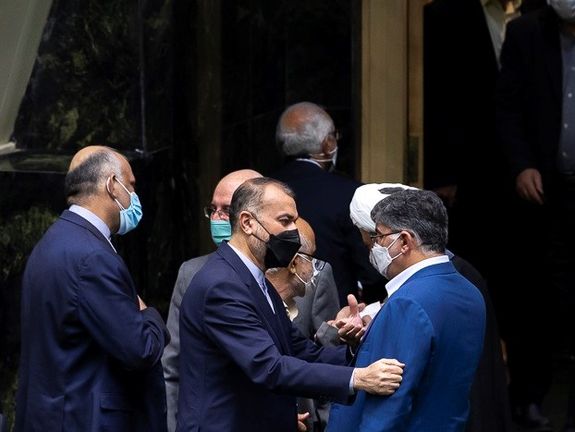
An Iranian lawmaker says there is no draft based on a final agreement of the Vienna negotiations to restore the 2015 nuclear deal between Iran and world powers.
Ebrahim Azizi, the deputy chairman of the Iranian Parliament's National Security and Foreign Policy Committee, said on Monday, “A draft that is the basis of the final agreement has not yet been prepared because the talks are still in the final stage and not completely over”.
He made the remarks in reaction to several Iranian lawmakers, including Ali Khezrian, who had claimed last week they had seen a 27-page final draft of an agreement between Iran and the United States, adding that Iran’s red lines were not considered in the draft.
Azizi added that no drafts have been submitted to the parliament but Foreign Minister Hossein Amir-Abdollahian and top negotiator Ali Bagheri-Kani have briefed different committees about the issues raised in the talks and the views of the negotiation parties.
European Union Foreign Policy chief Josep Borrell said in March that a draft text is "essentially ready", but hampered by "external factors".
Earlier in the day, Iran's foreign ministry spokesman Saeed Khatibzadeh said, "America is responsible for the halt of these talks and dragging it in coming days. The solution is in the White House. [The US] must give a logical response to Iran's request so that we can return to Vienna".
Khatibzadeh acknowledged for the first time in late February that a draft agreement is “97-98 percent ready”.
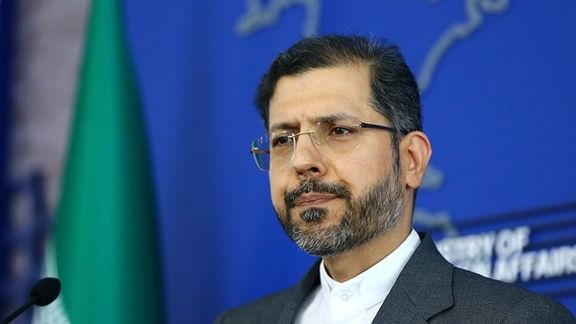
Iran's foreign ministry said Monday the United States was responsible for the halt in the Vienna nuclear talks by failing to make a "political decision".
"America is responsible for the halt of these talks and dragging it in coming days. The solution is in the White House. [The US] must give a logical response to Iran's request so that we can return to Vienna," Saeed Khatibzadeh told a weekly news conference in Tehran.
The spokesman did not say what was Iran’s proposal, but in recent weeks it has become clear that Tehran is asking Washington to remove the Revolutionary Guard from its list of foreign terrorist organizations.
Khatibzadeh reiterated that a deal to restore the 2015 nuclear deal, Joint Comprehensive Plan of Action (JCPOA), is within reach "if America realizes and knows for sure that we will not cross our red lines and demand," he told reporters adding that Tehran would "not wait forever" for the pact to be revived.
The Trump administration added the Revolutionary Guards (IRGC) to the US list of Foreign Terrorist Organizations (FTO), which is the only example of a sovereign state’s armed forces being so designated. Iran insists that delisting the IRGC is a requirement and 'red line' for a deal that it will not give up on.
US Special Envoy for Iran Robert Malley attending a conference in Doha last week said that he is not confident a nuclear deal between Western powers and Iran was imminent, adding that Washington would not remove the IRGC from its terror list.
"What happens in Vienna [talks] stems from the US approach which is trying to take the [solution of the] remaining issues hostage to its own domestic issues. Iran and Iranians can't remain patient forever," Khatibzadeh said referring to the delisting of the IRGC and strong opposition in the US Congress from Republicans and some Democrats.
Khatibzadeh’s remark about US “domestic issues” might be a reference to strong Congressional opposition to delisting the IRGC. Almost all Senate Republicans and many of their colleagues in the House of Representatives, as well as some Democrats oppose any concession on the issue.
Commenting on the European Union envoy in Vienna talks, Enrique Mora's, recent visit to Tehran the spokesman said Mora had received Iran's message and response to US demands. "We are still waiting for a response from the other party."
Mora met with foreign minister Hossein Amir-Abdollahian and top negotiator Ali Bagheri-Kani on March 27 to discuss the unresolved issues in the talks.
In a phone call with his Omani counterpart Sayyid Badr Albusaidi on Sunday, Amir-Abdollahian said Washington is directly responsible for the delay in reaching a nuclear deal.
Amir-Abdollahian criticized recent sanctions imposed by the US on some Iranian persons and companies, saying that Tehran is ready for a “good and lasting” agreement but the “American side has some maximalist demands and is directly responsible for the prolongation of the [nuclear] talks.”
Khatibzadeh also criticized the US for refusing entry to an Iranian vocalist last week to perform at an Iranian cultural event, presumably on the grounds that he had served his compulsory military service in the IRGC three decades ago.
Khatibzadeh also said that Iran does not tie regional issues to the nuclear talks and said Iran is prepared to resume talks with its regional rival, Saudi Arabia. "There is need for a clear agenda for the talks. We have offered our views to the Saudi side in written form. Our differences are clear and despite these differences we should seek to normalize our relations," he said.
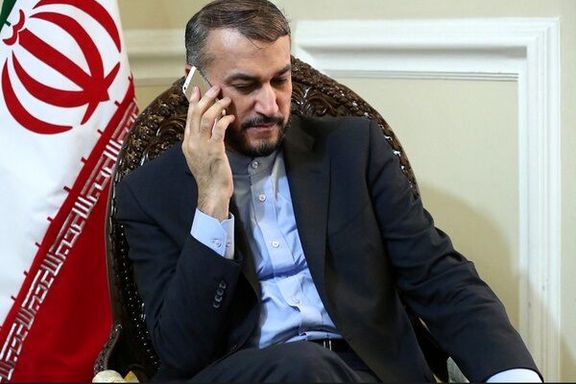
Washington is directly responsible for the delay in reaching a nuclear deal, Iran’s foreign minister told his Omani counterpart in a conversation late on Sunday.
Sayyid Badr Albusaidi, Oman’s foreign minister and Hossein Amir-Abdollahian discussed regional developments in a phone call, including a ceasefire that went into effect in Yemen on Saturday and nuclear talks between Iran and the United States, the government news website IRNA reported.
Officials of Muslim countries have been making calls on Sunday, on the occasion of Ramadan that started on Saturday in many Sunni countries and on Sunday in Iran.
Amir-Abdollahian criticized recent sanctions imposed by the US on some Iranian persons and companies, saying that Tehran is ready for a “good and lasting” agreement but the “American side has some maximalist demands and is directly responsible for the prolongation of the [nuclear] talks.”
Washington sanctioned an Iran-based network on March 30 for its role in procurements boosting Iran’s ballistic missile program, seen by many regional countries and the United States as a threat.
Although nearly one year of negotiations in Vienna were said to have reached its final stage, Tehran has demanded that the US remove its Revolutionary Guard from its list of ‘foreign terrorist organizations’. The Biden administration has apparently not made a decision yet, amid rising opposition by Republicans and some Democrats in Congress.